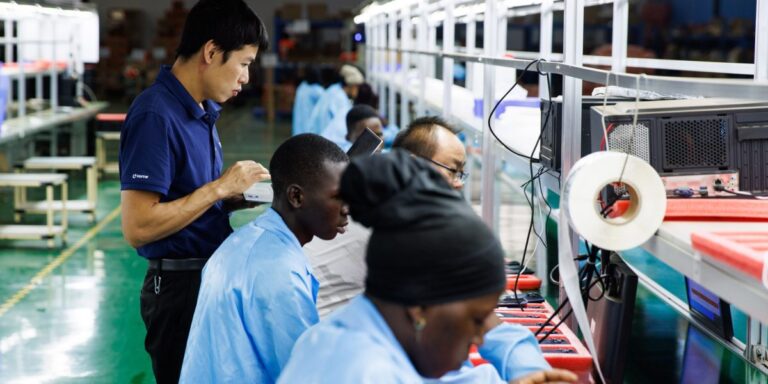
Anita Akpeere prepared fried rice in her kitchen in Ghana’s capital as a flood of restaurant order notifications lit up the apps on her phone. “I don’t think I could work without a phone in my line of work,” she said, as requests came in for her signature dish, a traditional fermented dumpling.
Internet-connected phones have transformed many lives, but they can play a unique role in Sub-Saharan Africa, where infrastructure and public services are among the least developed in the world, said Jenny Aker, a professor who studies the issue at Tufts University. At times, technology in Africa has filled gaps, including providing access to mobile money to people without bank accounts.
Despite growing mobile internet coverage on the continent of 1.3 billion people, only 25% of adults in sub-Saharan Africa have access, according to Claire Sibthorpe, head of digital inclusion at the lobby group UK-based mobile phone company, GSMA. Expenses are the main obstacle. The cheapest smartphone costs up to 95% of the monthly salary of the poorest 20% of the region’s population, Sibthorpe said.
Literacy rates below the global average and lack of services in many African languages (about 2,000 are spoken across the continent, according to Harvard University’s African Languages Program) are other reasons why a smartphone is not an interesting investment for some. .
“If you buy a car, it’s because you know how to drive it,” said Alain Capo-Chichi, general manager of the CERCO group, a company that developed a smartphone operated by voice command and available in 50 African languages including Yoruba, Swahili and Wolof.
Even in Ghana, where the lingua franca is English, knowing how to use smartphones and apps can be a challenge for newcomers.
A new company in Ghana is trying to bridge the digital divide. Uniti Networks offers financing to help make smartphones more affordable and supports users in navigating its application platform.
For Cyril Fianyo, a 64-year-old farmer from the Volta region of eastern Ghana, the phone has expanded beyond calls and texts. Using his ID card, he registered with Uniti, putting down a deposit of 340 Ghana Cedis ($25) for a smartphone and will pay the remaining 910 Cedis ($66) in installments.
He was shown how to navigate the apps he was interested in, including a third-party app. agricultural application called Cocoa Link which offers videos on planting techniques, weather information and details on climate change challenges that have affected cocoa and other cultures.
Fianyo, who previously planted according to his intuition and rarely interacted with agricultural advisors, was optimistic that the technology would increase his yields.
“I will know the exact time to plant from the weather forecast,” he said.
Kami Dar, chief executive of Uniti Networks, said mobile internet could help address other challenges, including access to healthcare. The company has launched in five communities across Ghana with 650 participants and aims to reach 100,000 users within five years.
Aker, the academic, noted that the potential impact of mobile phones across Africa is immense, but said there is little evidence that paid apps in health or agriculture benefit the populations of these countries. She said the only beneficial effects are the reminder to take medication or get vaccinated.
After studying agricultural applications and their impact, she said it doesn’t appear that farmers are getting better prices or improving their income.
CERCO Group’s Capo-Chichi said the lack of useful apps and content is another reason why more people in Africa are not buying smartphones.
Dar said Uniti Networks learns from its mistakes. In a pilot project in northern Ghana designed to help cocoa farmers contribute to their pensions, engagement was high, but farmers did not find the app user-friendly and had need additional support. Following feedback, the pension institution modified the interface to improve navigation.
Others take advantage of the Uniti platform. Hohoe church secretary Mawufemor Vitor said a health app helped her track her periods to avoid pregnancy. And Fianyo, the farmer, used the platform to find information on herbal medicine.
But mobile phones are no substitute for investments in utilities and infrastructure, Aker said.
She also expressed concerns about data privacy in the hands of private technology providers and governments. With the rise of digital IDs in African countries like Kenya and South Africa, this could open the door to further abuse, Aker said.
Uniti Networks is a for-profit company, paid for each customer who signs up for paid applications. Dar claimed he was not targeting vulnerable populations to sell them unnecessary services and said Uniti only offers apps that fit its idea of impact, with a focus on health, education , finance and agriculture.
Dar said Uniti had rejected money-making approaches from many businesses, including gambling companies. “Technology can be used for horrible things,” he said.
He acknowledged that Uniti tracks users on the platform to offer incentives, in the form of free data, and to provide feedback to app developers. He acknowledged that users’ health and financial data could be at risk from an outside attack, but said Uniti had decentralized data storage to try to reduce the risk.
Still, the potential for solutions may outweigh the risks, Aker said, highlighting two areas where technology could be transformative: education and insurance.
She said mobile phones could help overcome illiteracy which still affects 773 million people worldwide according to UNESCO. Increased access to insurance, still uncommon in parts of Africa, could offer protection to millions of people facing shocks on the front lines of climate change and conflict.
Back in the fields of Fianyo, his new smartphone arouses curiosity. “It’s something I would like to be a part of,” said Godsway Kwamigah, a neighboring farmer.


